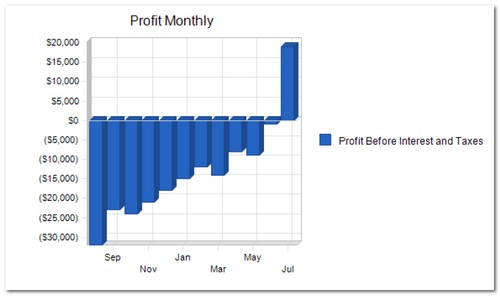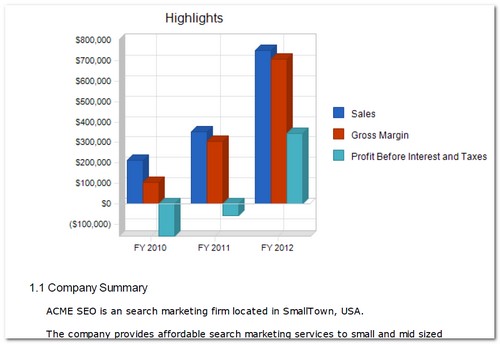
Often, in our rush to get ahead and do things, we forget to plan.
Do you have a business plan? Do you have a business plan, but haven't updated it in a while?
A business plan need not be complicated. A few bullet points scribbled on the back of an envelope can constitute a business plan. A business plan is simply a description of what you intend to do, and how you intend to do it. The advantage of having a plan written down is that your business becomes a lot easier to visualize.
There are a lot of resources available on writing business plans, but few address the specifics of SEO-driven businesses.
In this article, we'll cover business plan basics, then delve into the specifics of SEO related plans.
The Importance Of Writing Things Down
We all make lists. Why? Probably because our memories aren't that good. A list also helps to focus attention. There's something about the very act of writing things down that makes a nebulous action concrete.
The same theory applies to business plans.
For Whom Are You Writing The Business Plan?
Is you aim to attract VC? Get a loan from the bank? For internal staff to be clear about direction? For your own use? Depending on your answer, your business plan will have different requirements in terms of the information provided.
Business plans typically consist of the following components:
- Executive summary
- Products & Services Description
- Market Analysis
- Competitive Analysis
- Strategy & Implementation Plan
- Financial Plan
Business plans aren't just for start-ups, either.
As a business transitions through different stages as it grows, the plan needs to change. You might want to figure out the best way to invest or fund expansion. A new financial period may be beginning. What are your plans for the next financial year? Do you need to refinance? Are you taking on more employees? Does your old plan fit your new reality?
The Three Levels Of Business Planning
Short Plan
A plan could be as short as one page. Answer the following questions.
- What is your concept?
- How much money will you need to execute your plan?
- How do you intend to plan to market your business to customers/clients?
- What will your cash flow look like, and over what time frame?
Simple questions, right. Many business ideas can be adopted or dismissed on those four questions alone, saving you a lot of time, money, and opportunity cost. However, such short plans aren't suitable for seeking investment.
Presentation Plan
The essential difference between a working plan and a presentation plan is style and appearance. The tone is serious, and it usually comes complete with charts, forecasts and diagrams designed to convey to people that you've put a lot of consideration into your venture.
Presentation plans should be free of industry jargon. Investors like a lot of due diligence, especially when it comes to outlining competitive threats and market opportunities.
Working Plan
A working plan is a plan used to operate your business. Like a short plan, it is less formal in terms of style. It is used internally to ensure everyone has enough information to be on the same page.
SEO Business Models

Ready to dive into SEO as a full-time occupation?
Before you make that leap, let's take a look at a few business models you can choose from, and weigh the pros and cons of each.
For SEOBook.com members, I've written two, detailed business models in pdf format. These can be used as guides for planning your own SEO business model, and projecting your finances and revenue.
Client Service Model
This model includes seo agency and independent consultant.
Learn Business Strategies from Clients
There are some great advantages in this model, especially if you're well versed in SEO, but new to business. One advantage is that you get to see how other businesses operate, and get a close look at someone else's marketing strategy. If you're new to SEO, then it can be a good idea to get an agency job first. This way, you can learn the process of SEO, and how to win and negotiate with clients. View this as a training course if your eventual goal is working for yourself.
In terms of working for yourself, there are huge rewards, and huge challenges.
Focus on Business
One challenge is to describe how you're going to get new clients, how you're going to service those clients, and determine if you have enough time to service these clients and still make a profit. Often, SEOs focus on the technical aspect of the job, which is important, but the business aspects are what will make or break you, not your skills.
Billable Hours
The client service model is essentially about billing hours. The more hours you bill, the more money you make. Given that there are only 24 hours in the day, of which around half you could reasonably expect to consistently work (and still have time for sleep!), it is important to plan how much time a diverse range of tasks will take to achieve. These tasks include sales, accounting, billing, administration, purchasing, computer maintenance, and, if you get some time left over, SEO!
In order to scale up the number of billable hours, SEO service providers usually add more people. If your aim is to run as a sole operator, that's fine, just make sure you've got enough hours in the day to do what you need to do and make a profit, and consider outsourcing as much of the drudge work as possible.
SEO Publisher Model
This includes affiliate, Adsense and other content based models.
If you can get a site ranked well, then why aren't you doing it for yourself, rather than someone else?
Cost of Entry
The "cost of entry" to launch a website is almost zero. This is both a pro and a con. It's a pro, because you can easily bootstrap (meaning you can self fund) your venture and once you have rankings, you then sell the traffic to the highest bidder, by way of advertising, or revenue share, or both. There is little downside risk, other than it won't work. You've may have lost some time, but compare this with the loses associated with a failed brick n mortar operation!
The major downside, of course, is that anyone can compete with you.
Increasing Competition
The SEO publisher model used to be a lot easier than it is today. There was a time that SEO was a mystery to most webmasters and site owners. The biggest downside now is the level of competition. As we face more and more competition, this puts downward pressure on revenues, and only the determined will make good money.
Hard Work
However, there is still a lot of money on the table if you execute well, are determined, and prepared to put the work in. It's a cliche, but those who tend to work the hardest and smartest, benefit the most. A neuroscientist who worked with seven-time Formula One Drivers Champion Michael Schumacher said that he had never met anyone who worked so hard. The guy had natural talent, but it was the sheer hard work that put him above the other talented competition.
Same goes with SEO. When there is a lot of competition, you need to be more determined than your competition in order to succeed. If you've got a good work ethic, and thrive on competition, then an SEO publisher model might be a good fit for you.
Rather than asking "is this good enough to rank #1" you have to be willing to put in the extra effort to build a moat if you want to play where the big boys play. Aaron outlined his competitive strategy here.
New Markets
The obvious way around saturated markets is to look for new markets. If there are a lot of SEOs doing affiliate for any particular company or niche, then you're exposing yourself to a lot of competition. If it is easy for you to sign up and start as an affiliate, then it is easy for everyone else, too.
Instead, consider looking in keyword areas where there are few, if any, affiliates operating. If there is sufficient traffic in the niche, then approach companies directly and negotiate pay-per-lead or private affiliate deals. It can take a bit of effort up front, but the payoff is that you might have a keyword area all to yourself. Most people attracted to the affiliate area will be too lazy to do this.
Scalability
The SEO publisher model can be scaled more easily than the SEO consultant model, because scaling is as easy as publishing a new site. Once that site is revenue positive, you can further increase its rankings, start another, and so on. Many of the requirements are easily outsourced and do not require extensive , time consuming client interaction. But again, there are only 24 hours in the day, so once you're up and rolling, try to outsource as much as possible.
Get The Business Plans
If you are a subscriber you can download the business plans here, and for SEO professionals there is a secret confidential bonus worth over $500 located here.


